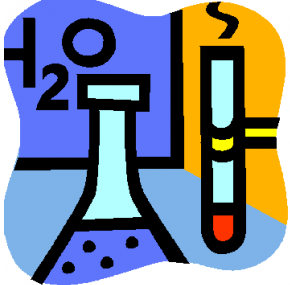
Sometimes chemical engineers end up in non-chemical businesses. I am one such engineer. In fact, I am my company's token chemical engineer. With this, there are the bragging rights of being the only chemical engineer. There are also the hazards of being the only chemical engineer, the dreaded
"um, someone told me you know chemistry" conversation starters. Often a reply such as
"you were misinformed" might be useful to escape the obvious next sentence of the conversation
"why does my plastic/glue/metal change color/texture/stickiness/strength?" Seeing as that I have the word "chemical" in my degree, obviously, I should have all the answers to any permutation of the above question--or so everyone believes.
There was the time that I went about calculating an approximation of how much coal we save through the energy savings of our products (assuming that coal was the only way to produce electricity--which was what marketing came up with). I spent an evening doing research and thoughtful calculations and presented my findings in an email to our Engineering Manager. Apparently he forwarded this on and eventually I got an email back from an individual that was questioning my calculations. The questioning email contained the sentence
"Well I read on the Internet..." maybe we should just stop right there since I already found the problem. The calculation the individual found on the internet used a coal furnace that generated electricity at 90% efficiency.
Really? I did have to write back and explain that the calculations he found were not based in reality... or any reality I have ever visited and that my approximations were reasonable given... well... reality?
Perhaps my favorite chemistry question went something like this:
"I need to find an adhesive that dries with kind of a grit. We found one overseas but the chemical formula got cut off on the fax... here's some of it, do you know what it is?"

Sure, let me use my magic wand. Of course there are no samples for me to look at, but then again, what would I use to analyze it? The standard-issue pliers, wire stripper and screwdrivers all the engineers are issued? Regardless, I gave it the good old college try. I looked in Perry's, Knovel, and my Polymer textbook from college as well as random internet searches and came up with nothing, but I am still not sure what it was I was looking for. The part of the chemical formula that was actually on the fax sheet was CH3, like that isn't part of thousands and thousands of compounds.
Pursuing a non-chemical career doesn't mean you won't get the chemistry related questions.
In fact, it probably means that you will get the more amusing chemistry-related questions. That is, of course, unless you don't divulge your field of study to anyone within your company. But that would be relinquishing the bragging rights associated with being the sole chemical engineer. Regardless, you can take the engineer out of chemistry but can't take the chemistry out of the engineer.
Any similar stories to share?
 Sometimes chemical engineers end up in non-chemical businesses. I am one such engineer. In fact, I am my company's token chemical engineer. With this, there are the bragging rights of being the only chemical engineer. There are also the hazards of being the only chemical engineer, the dreaded "um, someone told me you know chemistry" conversation starters. Often a reply such as "you were misinformed" might be useful to escape the obvious next sentence of the conversation "why does my plastic/glue/metal change color/texture/stickiness/strength?" Seeing as that I have the word "chemical" in my degree, obviously, I should have all the answers to any permutation of the above question--or so everyone believes.
There was the time that I went about calculating an approximation of how much coal we save through the energy savings of our products (assuming that coal was the only way to produce electricity--which was what marketing came up with). I spent an evening doing research and thoughtful calculations and presented my findings in an email to our Engineering Manager. Apparently he forwarded this on and eventually I got an email back from an individual that was questioning my calculations. The questioning email contained the sentence "Well I read on the Internet..." maybe we should just stop right there since I already found the problem. The calculation the individual found on the internet used a coal furnace that generated electricity at 90% efficiency.
Really? I did have to write back and explain that the calculations he found were not based in reality... or any reality I have ever visited and that my approximations were reasonable given... well... reality?
Sometimes chemical engineers end up in non-chemical businesses. I am one such engineer. In fact, I am my company's token chemical engineer. With this, there are the bragging rights of being the only chemical engineer. There are also the hazards of being the only chemical engineer, the dreaded "um, someone told me you know chemistry" conversation starters. Often a reply such as "you were misinformed" might be useful to escape the obvious next sentence of the conversation "why does my plastic/glue/metal change color/texture/stickiness/strength?" Seeing as that I have the word "chemical" in my degree, obviously, I should have all the answers to any permutation of the above question--or so everyone believes.
There was the time that I went about calculating an approximation of how much coal we save through the energy savings of our products (assuming that coal was the only way to produce electricity--which was what marketing came up with). I spent an evening doing research and thoughtful calculations and presented my findings in an email to our Engineering Manager. Apparently he forwarded this on and eventually I got an email back from an individual that was questioning my calculations. The questioning email contained the sentence "Well I read on the Internet..." maybe we should just stop right there since I already found the problem. The calculation the individual found on the internet used a coal furnace that generated electricity at 90% efficiency.
Really? I did have to write back and explain that the calculations he found were not based in reality... or any reality I have ever visited and that my approximations were reasonable given... well... reality?
 Sure, let me use my magic wand. Of course there are no samples for me to look at, but then again, what would I use to analyze it? The standard-issue pliers, wire stripper and screwdrivers all the engineers are issued? Regardless, I gave it the good old college try. I looked in Perry's, Knovel, and my Polymer textbook from college as well as random internet searches and came up with nothing, but I am still not sure what it was I was looking for. The part of the chemical formula that was actually on the fax sheet was CH3, like that isn't part of thousands and thousands of compounds.
Pursuing a non-chemical career doesn't mean you won't get the chemistry related questions. In fact, it probably means that you will get the more amusing chemistry-related questions. That is, of course, unless you don't divulge your field of study to anyone within your company. But that would be relinquishing the bragging rights associated with being the sole chemical engineer. Regardless, you can take the engineer out of chemistry but can't take the chemistry out of the engineer.
Sure, let me use my magic wand. Of course there are no samples for me to look at, but then again, what would I use to analyze it? The standard-issue pliers, wire stripper and screwdrivers all the engineers are issued? Regardless, I gave it the good old college try. I looked in Perry's, Knovel, and my Polymer textbook from college as well as random internet searches and came up with nothing, but I am still not sure what it was I was looking for. The part of the chemical formula that was actually on the fax sheet was CH3, like that isn't part of thousands and thousands of compounds.
Pursuing a non-chemical career doesn't mean you won't get the chemistry related questions. In fact, it probably means that you will get the more amusing chemistry-related questions. That is, of course, unless you don't divulge your field of study to anyone within your company. But that would be relinquishing the bragging rights associated with being the sole chemical engineer. Regardless, you can take the engineer out of chemistry but can't take the chemistry out of the engineer.








